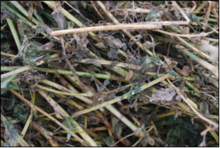Quick facts
- Don’t feed moldy hay to horses.
- Most moldy hay problems are from mold spores, which can produce respiratory disease in horses.
- Many of the common mold toxins develop in the field during a delayed harvest.
- If you suspect a mold toxin problem, review your horse’s nutrition and health. It’s hard to pinpoint a mold toxin problem because there are many factors. What may seem like a mold toxin problem could be another disorder or nutritional issue.
- To reduce the dust problems from moldy forage (will not reduce mold toxins)
- Feed in an area with good airflow
- Mix with a high moisture feed
- Wet the hay
Common molds in hay can produce spores that cause respiratory problems in horses. Under some conditions these molds may also produce toxins.
Heaves
Dust from mold spores can cause Recurrent Airway Obstruction (RAO), heaves in horses. Heaves is similar to asthma in humans.
Horses with heaves
- Have normal temperatures
- Have a good appetite
- Struggle during exercise because of coughing and nasal discharge
- Heavy breathing during exercise and sometimes at rest
- Develop a ‘heave line’ from the abdominal muscle becoming larger
Some horses are more allergic to certain mold spores than others. Horses with symptoms of heaves will differ in sensitivity levels to harmful triggers such as dust and poor air quality. To reduce your horse’s exposure to dust:
- Allow horses more time on pasture rather than a dusty paddock or inside a barn.
- Don’t feed dusty or moldy hay or grain.
- Use dust-free bedding such as shredded paper or rubber mats.
- Place feed at a lower level to prevent your horse from breathing in particles.
- Keep your horse out of the stable when you are cleaning and sweeping.
- Feed hay outside. In severe cases, replace hay with hay cubes.
- Soak dusty hay for 5 to 30 minutes before feeding so that the horse can eat it while it's wet.
- Store hay away from your horse if possible. Make sure any hay nearby is kept dry to prevent mold.
- If you house your horse indoors, make sure there’s good, draft-free air exchange through the barn
Mold spore counts can show how much mold is present in a feed and how safe it is to feed. Table 1 shows the health risk of feeding a moldy feed at different mold spore counts. Most molds don’t produce mycotoxins (mold toxins), but any moldy feed has the chance of having mold toxins. Watch animals for mold toxin symptoms if you feed moldy hay. It’s best to not feed horses moldy hay or grain.
Table 1. Feeding risks at various mold spore counts
| Mold spore count per gram | Feeding risk and cautions |
|---|---|
| Under 500,000 | Relatively low risk |
| ½ to 1 million | Relatively safe |
| 1 to 2 million | Feed with caution |
| 2 to 3 million | Closely observe animals and performance |
| 3 to 5 million | Dilute with other feeds |
| Over 5 million | Discontinue feeding |
Risks are mostly from the effect of mold without regard to possible amounts of mycotoxin. Dust may also reduce the amount of feed eaten.
- Not eating or eating less.
- Lower nutrient absorption and poor metabolism, which includes changes in digestion and microbial growth, diarrhea, intestinal upset, lower production, lower fertility, abortions, lethargy and increase in morbidity.
- Changes in the endocrine and exocrine systems. The endocrine system controls the body’s hormones and the exocrine system controls the flow of substances such as sweat from the skin.
- Weakened immune system, which makes horses prone to disease and respond poorly to medicine and vaccines.
- Organ damage.
If you see symptoms of mold toxin poisoning, check with a nutritionist to make sure your horse has a balanced ration and a veterinarian to make sure it isn’t another health problem.
You can use a quick test kit (ELISA kits) to check for the presence of a limited number of mold toxins, but they can give false positives. Some forage testing laboratories will provide other mold toxin tests. Often, the best strategy is to remove the contaminated feedstuff from the diet and see if the symptoms go away. If mold toxins are present, you can often feed it in small amounts with other feed or feed it with approved feed additives.
- Long drying periods with humid weather allows mold to grow on cut hay in the field
- Putting up wet hay allows mold growth while the hay is in storage. Mold grows on hay without preservatives at moisture levels over 15 percent.
- Wet and humid weather may prevent normal drying in storage. The hay may hold high moisture levels and mold.
- Alternaria
- Aspergillus
- Cladosporum
- Fusarium
- Mucor
- Penicillium
- Rhizopus
Data from Richard S. Adams, Kenneth B. Kephart, Virginia A. Ishler, Lawrence J. Hutchinson, and Gregory W. Roth. 1993. Mold and mycotoxin problems in livestock feeding. The Pennsylvania State University.
Reviewed in 2021


